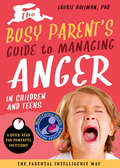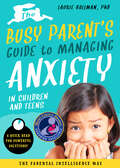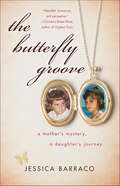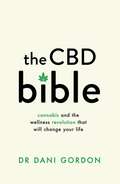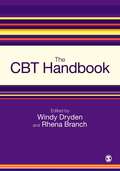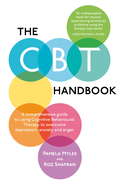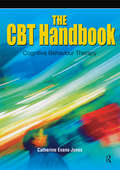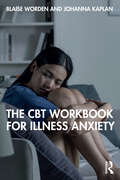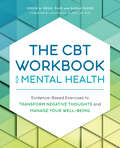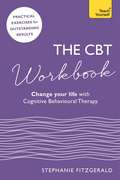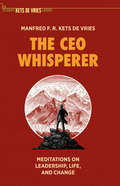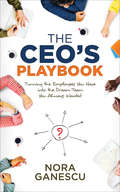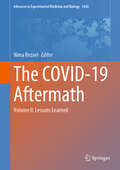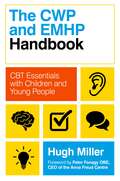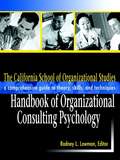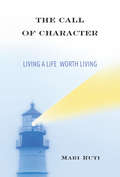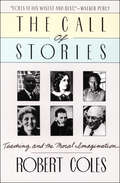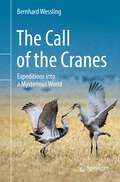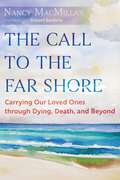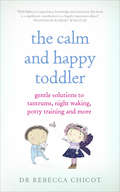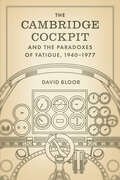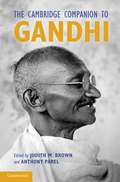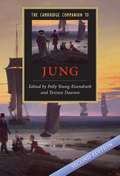- Table View
- List View
The Busy Parent's Guide to Managing Anger in Children and Teens: A Quick Read for Powerful Solutions (Busy Parent Guides: Quick Reads for Powerful Solutions #1)
by Laurie HollmanDo you have an angry child? “Do you wonder why your child or teen seems on edge, unduly angry, and restless at times—or maybe all the time? Are you uncertain if and when you should be worried? Are you so busy that sometimes you dismiss these thoughts but later reconsider them? You may be noticing you have a frequently angry child or teen.” (excerpt from Introduction) In this book, healthy expressions of anger are discussed, as well as, when kids repeatedly say “No,” experience temper tantrums, and have angry reactions in interpersonal situations. The book illustrates how parents help children and teens master these feelings the Parental Intelligence Way. The five steps to Parental Intelligence are explained with multiple examples of how busy parents use them to help angry kids solve problems. Parenting tips are elaborated in this quick read that offers powerful solutions for both ordinary and complex angry interactions. The audio is read by actor, Rich Hollman, son of the author, who was raised The Parental Intelligence Way.
The Busy Parent’s Guide to Managing Anxiety in Children and Teens: (Busy Parent Guides: Quick Reads for Powerful Solutions) (Busy Parent Guides: Quick Reads for Powerful Solutions #2)
by Laurie HollmanAre you the busy parent of an anxious child or teen? “Do you wonder why your child or teen seems on edge, unduly nervous, or restless at times—maybe all the time? Are you uncertain if and when you should be worried? Are you so busy that sometimes you dismiss these thoughts but later reconsider them? You may be noticing that you have an anxious child or teen.” (excerpt from Introduction).Do you know the signs of generalized anxiety, panic attacks, obsessional compulsive behavior or separation anxiety? In this book, vignettes of this wide range of anxiety states in children and teens are discussed along with how to help these kids master their anxiety the Parental Intelligence Way. Parenting tips are elaborated in this quick read that offers powerful solutions. The audio is read by actor, Rich Hollman, son of the author, who was raised The Parental Intelligence Way.
The Butterfly Groove: A Mother's Mystery, A Daughter's Journey
by Jessica BarracoA decade after twelve-year-old Jessica loses her mother, Dianne, to cancer complications, she finds herself curious about Dianne’s mysterious youth. Armed with a journalism degree, Jessica sets out on a quest to find two of Dianne’s former lovers, an old ballroom dance partner and a Vietnam war hero, along with anyone else who can tell her about Dianne. The Butterfly Groove features Jessica’s journalistic approach complemented by reimagined portions of Dianne’s life. Part mystery, part coming-of-age story across decades, this memoir is a heartwarming exploration of how our pasts tell our truths, and how love survives us all.
The CBD Bible: Cannabis and the Wellness Revolution That Will Change Your Life
by Dr Dani GordonWhat's the best natural product to help with my anxiety?Could cannabis cure my insomnia?Can you overdose on CBD oil?Will CBD gummies get me high?Cannabidiol, more commonly known as CBD, has become the hot new wellness ingredient, appearing in everything from oils to edibles and skincare products. Yet this brave new world of CBD and medical cannabis is full of pseudoscience, misinformation and confusion. Now internationally-recognised expert Dr Dani Gordon tells you everything you need to know in order to experience the benefits of this wellness revolution.As a medical doctor with years of clinical experience in prescribing cannabis and CBD in many forms, Dr Gordon is ideally placed to take us on an entertaining and enlightening journey about the cannabis plant and its benefits. She cuts through the hype, dispels the myths, and introduces us to the fascinating endocannabinoid system in our own body.The CBD Bible offers the most up to date evidence on the use of CBD for anxiety, depression, insomnia, joint pain and many other health concerns. Dr Gordon's reassuring and science-based advice will give you the confidence and the information to heal yourself with the power of plants.Dr Dani Gordon is a double board certified medical doctor, integrative medicine physician and world-leadingexpert in CBD and cannabis medicine. She has spoken on cannabis medicine at the UN and to government bodies.
The CBT Handbook
by Windy Dryden Rhena BranchThe CBT Handbook is the most comprehensive text of its kind and an essential resource for trainees and practitioners alike. Comprising 26 accessible chapters from leading experts in the field, the book covers CBT theory, practice and research. Chapters include: - CBT Theory - CBT Skills - Assessment and Case Formulation in CBT - The Therapeutic Relationship in CBT - Values and Ethics in CBT - Reflective and Self-Evaluative Practice in CBT - Supervision of CBT Therapists - Multi-disciplinary working in CBT Practice This engaging book will prove an indispensible resource for CBT trainees and practitioners.
The CBT Handbook: A comprehensive guide to using Cognitive Behavioural Therapy to overcome depression, anxiety and anger
by Roz Shafran Pamela MylesCognitive Behavioural Therapy or CBT is widely recommended nowadays in the NHS for the treatment of emotional and psychological problems, such as depression, low self-esteem, low mood, chronic anxiety, stress or out-of-control anger. This thorough yet easy-to-read general self-help guide is a must-have for anyone experiencing these common problems. Based on the popular and proven therapy CBT, it is written by two of the UK's leading experts in the field of CBT. It contains: Case studies and step-by-step CBT-based exercises. Based on the very latest research into CBT. Addresses problems associated with depression, anxiety, stress, anger and low self-esteem in individual chapters. Both for those suffering from these issues and clinicians.
The CBT Handbook: A comprehensive guide to using Cognitive Behavioural Therapy to overcome depression, anxiety and anger
by Roz Shafran Pamela Myles-HootonOvercoming app now available via iTunes and the Google Play Store.Cognitive Behavioural Therapy or CBT is widely recommended nowadays in the NHS for the treatment of emotional and psychological problems, such as depression, low self-esteem, low mood, chronic anxiety, stress or out-of-control anger. This thorough yet easy-to-read general self-help guide is a must-have for anyone experiencing these common problems. Based on the popular and proven therapy CBT, it is written by two of the UK's leading experts in the field of CBT.It contains:Case studies and step-by-step CBT-based exercises.Based on the very latest research into CBT.Addresses problems associated with depression, anxiety, stress, anger and low self-esteem inindividual chapters.Both for those suffering from these issues and clinicians.
The CBT Handbook: Cognitive Behavioural Therapy
by Catherine Evans-JonesThis is a comprehensive resource of photocopiable worksheets to aid therapeutic intervention. Cognitive behavioural therapy (CBT) aims to help people overcome their emotional difficulties through helping them identify and change their thoughts and behaviour. CBT has been evaluated for a wide range of presenting problems and evidence of its efficacy found for depression, panic, agoraphobia, generalised anxiety disorder (GAD), specific phobia, social phobia, obsessive-compulsive disorder (OCD) and post-traumatic stress disorder (PTSD). This eminently practical book provides more than 80 A4 photocopiable worksheets for cognitive behavioural therapists to use with clients. As well as covering the fundamental techniques of CBT, it supplies worksheets specific to presenting problems, such as OCD, panic and worry. Worksheets are essential tools in CBT. They record events and patterns, provide new information, and suggest new ways of thinking and acting. When and how to use a worksheet is determined by a number of factors: the formulation, the stage in therapy, the current focus of treatment, the reading and writing ability of the client and the wishes of the client. The use of worksheets in CBT is an ongoing learning process for both therapists and clients. This is a fantastic resource for all clinicians working within the cognitive behavioural model.
The CBT Workbook for Illness Anxiety
by Johanna Kaplan Blaise WordenThis cognitive behavioral therapy (CBT) workbook is a detailed, step-by-step account of how to do scientifically supported treatment with adults experiencing illness anxiety.Written by two practitioners with years of specialized training and expertise in CBT for anxiety, this book provides a comprehensive overview of illness anxiety disorder and an exposure-based framework to target fear and avoidance. Detailed exercises and homework are included throughout, as well as charts, diagrams, and a relapse prevention plan. This workbook aims to give illness anxiety sufferers the skills needed to work through the therapeutic journey in decreasing anxiety and beginning recovery.This book is essential for those with illness- or health-related anxiety looking to do self-help or to use with therapists in sessions, along with practicing clinicians who need specialized guidance.
The CBT Workbook for Mental Health: Evidence-Based Exercises to Transform Negative Thoughts and Manage Your Well-Being
by Sarah Fader Simon Rego PsyDLive more positively with simple exercises based in cognitive behavioral therapyNot every mental health struggle involves a life-altering event or an official diagnosis, but that doesn't mean it can't take a toll on your life and happiness. The CBT Workbook for Mental Health shows you how to cultivate your sense of calm and confidence through the power of cognitive behavioral therapy. With expert advice, you'll learn how to use CBT to bounce back from tough times—no matter how big or small.In this CBT workbook for mental health, you'll find methods to overcome your stress and improve your self-esteem:Specific solutions—Build a range of coping skills with chapters devoted to common issues: relationships and communication, anxiety, anger, stress, guilt, shame, and self-esteem.Simple exercises—The prompts and exercises in this CBT workbook only take between 10 and 30 minutes, so you can find time to practice them even on your busiest days.CBT for everyone—Discover how CBT works and what makes it so popular, with a range of exercises that help improve general emotional wellness.Learn the skills to maintain your inner peace and emotional well-being every day with The CBT Workbook for Mental Health.
The CBT Workbook: Use CBT to Change Your Life
by Dr Stephanie FitzgeraldThe practical way to the best results.Do you want to find out how CBT can help you achieve your goals? Do you want to challenge and change your negative thoughts? Do you want to free yourself from depression, anxiety and low moods and embrace a happier way of life? This new Teach Yourself Workbook doesn't just tell you how to use CBT to improve your life. It accompanies you every step of the way, with diagnostic tools, goal-setting charts, practical exercises, and many more features ideal for people who want a more active style of learning. The book helps you set specific goals to improve on; as you progress, you will be able to keep checking your progress against these goals. Specially created exercises will help you boost your skills and communication so that you can reach your potential in any situation.
The CBT Workbook: Use CBT to Change Your Life
by Stephanie FitzgeraldThe practical way to the best results.Do you want to find out how CBT (Cognitive Behavioral Therapy) can help you achieve your goals? Do you want to challenge and change your negative thoughts? Do you want to free yourself from depression, anxiety and low moods and embrace a happier way of life? This new Teach Yourself Workbook doesn't just tell you how to use CBT to improve your life. It accompanies you every step of the way, with diagnostic tools, goal-setting charts, practical exercises, and many more features ideal for people who want a more active style of learning. The book helps you set specific goals to improve on; as you progress, you will be able to keep checking your progress against these goals. Specially created exercises will help you boost your skills and communication so that you can reach your potential in any situation.
The CEO Whisperer: Meditations on Leadership, Life, and Change (The Palgrave Kets de Vries Library)
by Manfred F. Kets de VriesAt this critical junction in the history of humankind, leaders that are proficient in magical thinking aren’t going to solve our problems. Creating alternative realities is not the answer. We need a very different kind of leadership—leaders who can resist the calls of regression and whose outlook is firmly based in reality. We need leaders who analyze and draw conclusions from, or use their own experiences as a development tool, face their strengths and weaknesses, and critique their own experiences in order to build new understandings. In this very personal and entertaining book, Manfred Kets de Vries, one of the “gurus” in the field of leadership studies offers his thoughts on leadership and life, reflections written for executives and the people who deal with them. As a psychoanalyst and leadership professor let loose in the world of renowned global organizations—as a passionate educator and scholar, or just a human being at the receiving end of heart-rending emails—he examines the pitfalls of leadership and the challenges for the professionals who work with senior executives in today’s AI-focused world. He points out why leaders can derail, and what steps they can take to prevent this from happening. Ultimately, this book encourages you to “Know yourself,” but makes no bones about the challenge it represents. Understanding our “inner theatre” will always be an uphill struggle. Kets de Vries points out why deep dives into our inner world are always fraught with many anxieties. Included in the many subjects covered by the author are the loneliness of command, the management of disappointment, the destructive role of greed, the impact of stubbornness, the role of storytelling, the importance of wellness, and the role of corporate culture. In addition, the book addresses the important topic of how to create great teams and best places to work. Furthermore, the book touches on endings– the ending of our career and the growing realization of the inevitable ending of our life. As time grows short, Kets de Vries emphasizes that we have no time to lose in dealing with our anxieties, regrets, and the things we spend much of our life determined not to see. Taking a deep dive into self-knowledge requires courage and support, and he is here to guide you through it.
The CEO’s Playbook: Turning the Employees You Have into the Dream Team You Always Wanted
by Nora GanescuMany business leaders love their work and their company, but don’t know what else to do to get their employees to love it, too. Their employees may be good people; however, leaders who want their team to become brilliant together are facing roadblocks. In The CEO’s Playbook, Nora Ganescu shows businesses how to become that exciting and innovative workplace that creates one game-changing success after the other. She also understands the importance of key elements such as dedication, passion, and joy at work and teaches leaders how to instill these qualities within their employees. If running your company feels more like pushing a huge boulder up the mountain, then you are not alone. The CEO’s Playbook can help.
The COVID-19 Aftermath: Volume II: Lessons Learned (Advances in Experimental Medicine and Biology #1458)
by Nima RezaeiThis book discusses different challenges imposed to the globe following the COVID-19 pandemic. Coronavirus disease 2019 (COVID-19) has affected humans’ individual lives, communities, and the world. It has not only affected human’s lives but also environmental and natural systems. To better appreciate the pandemic’s influence, multidisciplinary and interdisciplinary approaches are needed. Also, lessons learned from facing the pandemic are reviewed to be used for combating the upcoming challenges in healthcare settings, mental and psychological health, education, natural resources, energy system, environment balance, economic stability, social relations, etc.
The CWP and EMHP Handbook: CBT Essentials with Children and Young People
by Hugh MillerAs an Education Mental Health Practitioner (EMHP) or Children's Wellbeing Practitioner (CWP), you have to think on your feet, manage a caseload, deal with emotional distress and try and not get indigestion as you cram down a sandwich on your way to your next session.This down-to-earth survival guide helps trainees and newly qualified practitioners cope with the stressful demands of these new and challenging roles. Full of case examples and practical tools and strategies, this book will give you the confidence to assess, set goals, and deliver effective interventions for anxiety and depression. It also provides invaluable support on tricky topics such as disclosures of risk and safeguarding issues, working effectively with parents, dealing with resistance and conflict, caring for yourself, and signposting when a situation is outside the remit of your role.
The California School of Organizational Studies Handbook of Organizational Consulting Psychology
by Rodney L. Lowman California School of Organizational Studies at Alliant International UniversityDiscover a wealth of issues in the field of consulting psychology with this landmark book. Explore key topics in assessment and evaluation, building teams, executive coaching, career counseling, interpersonal conflicts and relationships, benefit design, personality testing, and much more. Learn to delineate and better understand the wide array of information you are faced with, and become more adept and knowledgeable in the field of consulting psychology. This comprehensive volume has expert contributors recruited by the volume's editor--himself an eminent educator and practitioner in the field. You will get: Special issues in consulting to specific types of organizations including industry, schools, government, non-profit, and international Informative guidelines for professional practice procedures Organized sections on individual, group and organizational issues And much more!
The Call of Character: Living a Life Worth Living
by Mari RutiShould we feel inadequate when we fail to be healthy, balanced, and well-adjusted? Is it realistic or even desirable to strive for such an existential equilibrium? Condemning our current cultural obsession with cheerfulness and "positive thinking," Mari Ruti calls for a resurrection of character that honors our more eccentric frequencies and argues that sometimes a tormented and anxiety-ridden life can also be rewarding. Ruti critiques the search for personal meaning and pragmatic attempts to normalize human beings' unruly and idiosyncratic natures. Exposing the tragic banality of a happy life commonly lived, she instead emphasizes the advantages of a lopsided life rich in passion and fortitude. She also shows what matters is not our ability to evade existential uncertainty but our courage to meet adversity in such a way that we do not become irrevocably broken. We are in danger of losing the capacity to cope with complexity, ambiguity, melancholia, disorientation, and disappointment, Ruti warns, leaving us feeling less "real" and less connected and unable to process a full range of emotions. Heeding the call of our character means acknowledging the marginalized, chaotic aspects of our being, and it is precisely these creative qualities that make us inimitable and irreplaceable.
The Call of Stories: Teaching and the Moral Imagination
by Robert ColesFrom the Pulitzer Prize-winning author of Children of Crisis, a profound examination of how listening to stories promotes learning and self-discovery. As a professor emeritus at Harvard University, a renowned child psychiatrist, and the author of more than forty books, including The Moral Intelligence of Children, Robert Coles knows better than anyone the transformative power of learning and literature on young minds. In this &“persuasive&” book (The New York Times Book Review), Coles convenes a virtual symposium of college, law, and medical school students to explore the phenomenon of storytelling as a source of values and character. Here are transcriptions of classroom conversations in which Coles and his students discuss the impact of particular works of literature on their moral development. Here also are Coles&’s intimate personal reflections on his experiences in the civil rights movement, his child psychiatry practice, and his interactions with his own literary mentors including William Carlos Williams and L.E. Sissman. The life lessons learned from these stories are of special resonance to doctors and teachers looking to apply them in classroom and clinical environments. The rare public intellectual to be honored with a MacArthur Award, a Presidential Medal of Freedom, and a National Humanities Medal, Robert Coles is a true national treasure, and The Call of Stories is, in the words of National Book Award winner Walker Percy, &“Coles at his wisest and best.&”
The Call of the Cranes: Expeditions into a Mysterious World
by Bernhard WesslingCranes are enigmatic birds. Only very little is known about the behaviour of these graceful dancers. The renowned naturalist and crane expert Bernhard Wessling takes us on exciting and adventurous expeditions into their hidden world and gets to the bottom of the myths surrounding these birds of happiness. With the help of a specially developed bioacoustic method, Dr. Wessling studied Eurasian, Red-Crowned, Sandhill and Whooping Cranes, all in the wild. He has researched their intelligence, social dynamics and communication and engaged in their protection. Impressively illustrated and lively narrated, this book presents his findings on their individually unique lives and relationships, their ability to adapt and solve problems, and their emotions. His observations allow us to delve deeply into the cranes' way of life and consciousness, often demonstrating the surprising similarities between humans and animals. An amazing work about the spirit of discovery, humility and respect for nature in the tradition of Alexander von Humboldt.Cranes are among the most captivating birds on this planet. Dr. Wessling knows these birds, has accumulated a lifetime of observations on them, and has thought deeply about their abilities. In this book, he seeks to overturn old ideas about how these birds live, communicate, and think. His revelations surprise and delight and shed new light on an ancient avian family. Jennifer Ackerman, author of the New York Times bestseller The Genius of Birds and The Bird WayThe Call of the Cranes is a mesmerizing, vivid, lyrical and revelatory book. It truly is a spectacular book and a treasure! Sy Montgomery, naturalist and author of 31 books (incl. the New York Times bestseller The Soul of an Octopus: A Surprising Exploration into the Wonder of Consciousness)In this book, Bernhard Wessling shares his fascinating stories about cranes through patient observations and thoughtful conclusions. George Archibald, Co-Founder of the International Crane Foundation, Senior Conservationist
The Call to the Far Shore: Carrying Our Loved Ones through Dying, Death, and Beyond
by Nancy MacMillan• Explores how to carry our loved ones through death, how to honor their bodies and spirits, and how to awaken to the ever-present help of our ancestors• Reveals the healing and closure that can be brought about through the process of washing and preparing a body for a home vigil or funeral• Offers guidance on advance care planning, grieving, and forgiveness as well as green burialHaving become disconnected from the natural cycles of life, we have lost the fundamental knowing of what death looks like, and fear fills the void. How can we transform our fears surrounding death and be with the dying more fully and more consciously?Through her work with the dying, Nancy MacMillan reveals the very real imaginal world where nature, myth, dreams, ancestors, and those yet to be born whisper from the far shore, a place beyond our last breath. She reminds us that caring for our dying consciously is a transformative act, radical even, in restoring meaning to our place and purpose in the universe. She explores how to carry our loved ones through death, how to honor their bodies and spirits, and how to awaken to the ever-present help of our ancestors. She shows how the practice of caring for the dead can help both those grieving and the newly dead, and she reveals how healing and closure can be brought about through the process of washing and preparing a body for a home vigil or funeral—a ritual she provided for her own mother.Sharing personal stories, Nancy offers guidance on advance care planning, grieving, and forgiveness as well as green burial. Through her own close encounters with the specter of death, the author shows how to follow the ancient wisdom of "learning to die before you die" and find a seaworthy passage to the far shore.
The Calm and Happy Toddler: Gentle Solutions to Tantrums, Night Waking, Potty Training and More
by Dr Dr Rebecca ChicotChild development expert Dr Rebecca Chicot shares with you the secrets to calm and stress-free toddler parenting. Based on her unique parent–toddler approach, she reveals that by understanding how your toddler thinks and what changes he is going through, you can respond with confidence and stop sweating the small stuff. Whether you need help with tantrums, night waking, potty training or fussy eating, inside you’ll find: · A toddler toolkit to help you cope with every toddler scenario · A fire-fighting guide to hand-hold you through the classic toddler challenges; No! Now! Mine! Yuk! · A toddler development map to show you how your toddler is changing, what stage they are at, and how to best to enjoy and encourage their mental, social and emotional development The Calm and Happy Toddler is the ‘how to’ and ‘why’ of toddler parenting: read this book to understand your toddler, get on the same team and thrive together.
The Cambridge Cockpit and the Paradoxes of Fatigue, 1940–1977
by David BloorThe story of a unique and controversial wartime study of pilot fatigue. During World War II, members of the Cambridge Psychology Laboratory were commissioned to study pilot fatigue. They set up a Spitfire cockpit in the laboratory, turned it into a piece of laboratory apparatus, and carried out a series of important experiments that appeared to dramatically confirm the dangers of fatigue. Historians of psychology are aware of this episode, but the experiments, the events surrounding them, and the scientific reasoning involved have never been studied in detail. By going into the episode in depth, and by looking behind the scenes at archival material, David Bloor offers an analysis that is both original and more penetrating than anything that has been said before on the topic. Bloor describes the Cockpit experiments themselves before turning to the theoretical interpretation of the results and the intellectual resources that informed how they were viewed. Bloor then explains a major empirical and theoretical challenge to the Cambridge Cockpit work drawn from a field study of landing accidents apparently showing that fatigue-effects were operationally negligible. Bloor delves into the consequences of this challenge, and the Cambridge reaction to it, in the post-war years. The analysis is deepened by comparison with the corresponding wartime work on fatigue carried out both in Germany and the United States. As the author demonstrates, even today the Cambridge Cockpit experiments pose a challenge to the current understanding of pilot fatigue.
The Cambridge Companion to Gandhi
by Judith M. Brown Anthony ParelEven today, six decades after his assassination in January 1948, Mahatma Gandhi is still revered as the father of the Indian nation. His intellectual and moral legacy, and the example of his life and politics, serve as an inspiration to human rights and peace movements, political activists and students. This book, comprised of essays by renowned experts in the fields of Indian history and philosophy, traces Gandhi's extraordinary story. The first part of the book explores his transformation from a small-town lawyer during his early life in South Africa into a skilled political activist and leader of civil resistance in India. The second part is devoted to Gandhi's key writings and his thinking on a broad range of topics, including religion, conflict, politics and social relations. The final part reflects on Gandhi's image and on his legacy in India, the West, and beyond.
The Cambridge Companion to Jung
by Polly Young-Eisendrath Terence DawsonThis new edition represents a wide-ranging and up to date critical introduction to the psychology of Carl Jung, one of the founders of psychoanalysis. Including two new essays and thorough revisions of most of the original chapters, it constitutes a radical new assessment of his legacy. Andrew Samuels's introduction succinctly articulates the challenges facing the Jungian community. The fifteen essays set Jung in the context of his own time, outline the current practice and theory of Jungian psychology and show how Jungians continue to question and evolve his thinking and apply it to aspects of modern culture and psychoanalysis. The volume includes a full chronology of Jung's life and work, extensively revised and up to date bibliographies, a case study and a glossary. It is an indispensable reference tool for both students and specialists, written by an international team of Jungian analysts and scholars from various disciplines.
